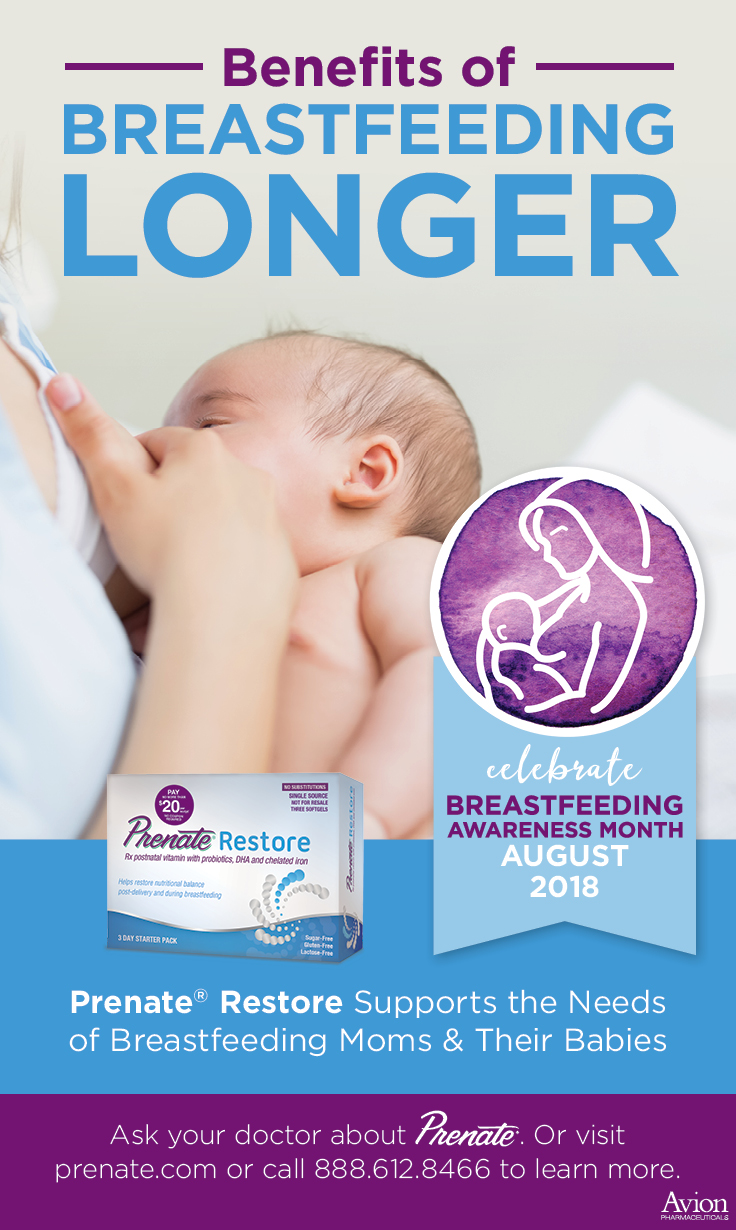Physical and Mental Benefits of Extended Breastfeeding
August 15, 2018
In the United States, fewer than 25 percent of new moms breastfeed their infants past the age of six months.1 However, there are numerous physical and mental benefits associated with extended breastfeeding that could help a new mom decide how long to breastfeed her child.
The American Academy of Pediatrics (AAP) currently recommends that mothers breastfeed for the first six months of their babies’ lives.2 In fact, AAP says that moms should ideally feed their babies nothing but breast milk during this time.
After the six-month mark, the AAP says moms should introduce solid foods to their babies while continuing to breastfeed. The AAP indicates that breastfeeding is fine if both mom and baby want to continue after the age of one year.2
Benefits for Baby
Ailments and diseases are less common in babies who are breastfed for at least six months. In the case of celiac disease, babies who were breastfed at the time that gluten was introduced to their diets had a 52 percent reduction in risk of developing the disease.3
A lower risk of Sudden Infant Death Syndrome is one of the most important benefits of breastfeeding.4 Infants that breastfeed exclusively past the six-month mark also have a lower rate of respiratory tract infections, such as pneumonia, when compared with infants who breastfed exclusively for only four to six months.5
Mothers who extend breastfeeding also protect their babies against gastrointestinal tract infections. Breastfed babies have a 64 percent reduction in reported nonspecific gastrointestinal tract infections as compared to formula-fed babies. This protective benefit extends two months past weaning.6
For babies, breastfeeding may be an important indicator of future mental health. Breastfeeding throughout the first year of life was found to be a supporting factor in better mental health through age 14, according to one study.10 The study showed that the longer a child could breastfeed, the more profound this effect was on his or her future mental health.
Studies also have shown a link between breastfeeding and a reduced risk in obesity later in life. The prevention of obesity throughout life is important, and researchers believe that behaviors that affect obesity begin during infancy. Breastfed infants self-regulate their intake during feeding, which supports their ability to develop self-regulating cues that govern their food intake later in life. Infants who only nurse from the breast have better self-regulation past the age of six months and a lower rate of excessive weight gain.7
Benefits for Mom
New mothers may feel that they are irritable, easily distracted, or lacking energy. They may also find that changing hormones cause fatigue and make their adjustment to motherhood more difficult. Oxytocin is a hormone released by lactating mothers during breastfeeding.8 Its natural calming effect is of great benefit to new moms. Breastfeeding mothers also get the benefit of the important milk-producing hormone prolactin during the entire time that they breastfeed.9
Mothers who breastfeed also enjoy the benefits of an increased metabolic rate. Those benefits are most profound when women choose to breastfeed until their babies are between nine months and 24 months old.11 Another benefit is that the hormones released in the body during breastfeeding also help to reduce the uterus to its pre-pregnancy size.
Prenate® Restore is a once-daily vitamin for breastfeeding mothers that’s designed to support the nutritional needs of moms and their babies. Prenate® Restore includes nutrients such as calcium, vitamin D, DHA and probiotics that help infants achieve optimal growth and promote brain, immune system and gut development.12-14 Prenate® Restore is also appropriate during pregnancy, which means that expecting moms can start supplementation with Prenate® Restore before the arrival of their baby and continue taking it through delivery and postpartum. Talk to your doctor to see if Prenate® Restore is right for you.
You Are About To Leave This Website
By clicking continue, this link will take you to a website to which Alora Pharmaceuticals Policies & Terms of Use do not apply. Alora and its subsidiaries do not control the content or accuracy of third-party websites and assume no responsibility for their use.
















